Environmentally Conscious Living in Baranja - Popovac Eco School
June the 9th, 2020 - Popovac is a small village located under the only small hill in Baranja called Banovo brdo, nestled away in the north east of the country, between Osijek and the nearby Hungarian border. Popovac's small village school is not your average school, however...
Beautiful nature surrounds the area, the view of the green fields and dense forests is spectacular. It isn't something unusual to have the feeling that you need to protect nature when you see the beauty of Baranja.
Popovac is a place with one school, one shop, one post office but one big ecological soul. The Popovac primary school boasts the diamant status for participating in an International eco-schools programme. Our school made a note that the environment and eco-living is a very important part of school life where the students can learn new skills and ways to make the environment around them better and save the nature we're so lucky to have for the future.
Through many years of experience, the Popovac primary school made a lot of progress and included the local community in learning and becoming more aware of the basic environmental needs which can improve the lives of every single person living in the village of Popovac.
But, just what are eco-schools? International eco-schools is a programme designed to implement environmental education guidelines throughout educational institutions (primary and secondary schools, kindergartens and boarding schools, special needs schools and even colleges), and the National Coordinator of the Ecological School in the Republic of Croatia is the Lijepa naša Association.
The International eco-school programme was developed by the Foundation for Environmental Education (FEE) in response to the 1992 UN Conference. The programmew was officially launched back in 1994 in several European countries, including Denmark, Germany, Greece and the United Kingdom. Today, eco-schools are conducted in more than 64 countries around the world, connecting as many as 49,000 schools.
At the beginning of every school year, all of us at school think about ecological ideas for most of the school's subjects that we can implement into the curriculum. Through all these years, we managed to develop a lot. From day-long school projects to monthly and year projects, the idea spread further, getting involved in projects on the scale of Erasmus+ projects. The Popovac primary school's praiseworthy project is called ''Kids against plastic pollution''.
The programme is designed to present our ecological ideas to partner schools in Norway, Turkey and Romania. At the meetings, we presented our eco-school in beautiful Baranja, and we're very proud of being the only one with the status of eco-school. Now, in the distance learning era, we continue to be active virtually. We're not physically at the school, but the students made a short video from home about plastic pollution which included their own ecological messages.
This experience of needing to stay at home and stay safe made the students realise what they have learned through their activities at school and what they can do at home too. They are now aware of the amount of plastic that their family uses and could talk about how to reduce that problem. On a monthly basis, students of the Popovac primary school are continuing to collect plastic bottle lids and are in the national project to help purchase expensive medicine.
Every school teacher can be proud of the results that the younger generations achieve thanks to the environmental education presented to them in their school classrooms. They are aware that young generations are sensitive to environmental issues and by being active in that field, they promote environmental concern as a value and as a of life.
For the next school year, new goals will be set and the importance of protecting our environment will be presented to yet another new generation of children who will be the bearers of responsibility for the school and the wider local community. Local government representatives are also included into our actions and are supporting the school's ideas which are pushed by proactive young people who are going to live eco-friendly lives and think of the
future, and not only of themselves.
Text by Marijana Kuna
For more, follow Total Eco Croatia.
Popovac on Tour: Baranja School Fighting Plastic Pollution in Turkey
Students from Popovac Primary School have just returned from a week in Manavgat, a town in the south of Turkey, where they participated in the third of four mobilities of the Erasmus+ project „Kids Against Plastic Pollution“.
On January 12th, 2020, Dorian Hranić, Dora Knez, Mateo Koprivec, Ema Rudnički, Leonora Vereš and Patrik Štainer, accompanied by teachers Goran Podunavc and Suzana Vencl, arrived in sun-kissed Antalya to continue their fight against plastic pollution with new friends from Turkey, Norway and Romania.
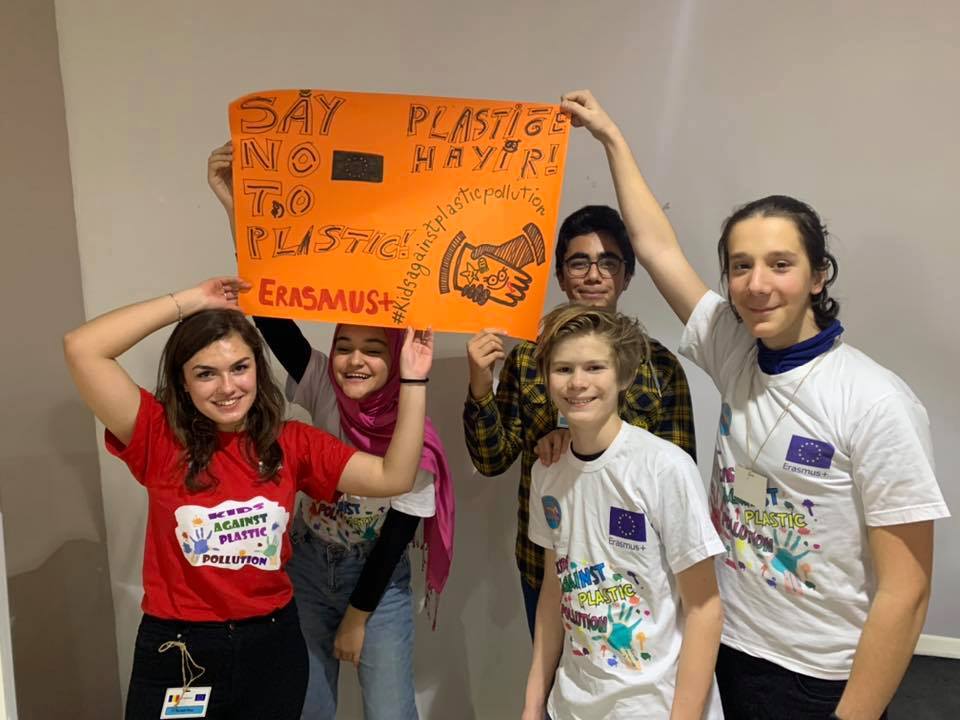
The host organizers prepared a program full of interesting activities. First, students learned how to make a successful campaign against plastic pollution. In international groups, they then made posters which they used to attract the attention of passengers during the beach cleaning later in the with. Using their own examples, the students showed that each change starts within each of us. The students also heard from the governor of Manavgat, who spoke about what the town does when it comes to the problem of plastic pollution.
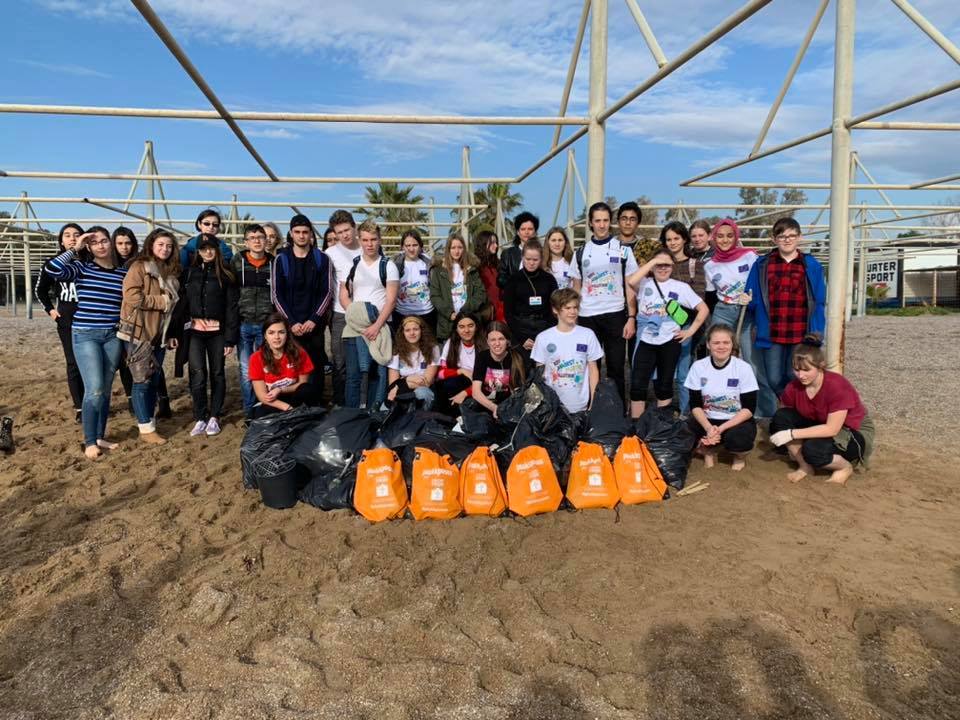
With slogans and drawings on posters, the students pointed on the problem of plastic pollution and on the need for action from all of us when it comes to saving nature. During a visit to one of the wastewater treatment plants in the town, they heard shocking facts regarding the most common plastic objects that wind up in the sewage. During the summer the population of 300 hundred citizens in Manavgat grows to one million. Irresponsible guests are the ones who mostly throw wet towels in toilets and since they are non-degradable they also wind up in seas and oceans.
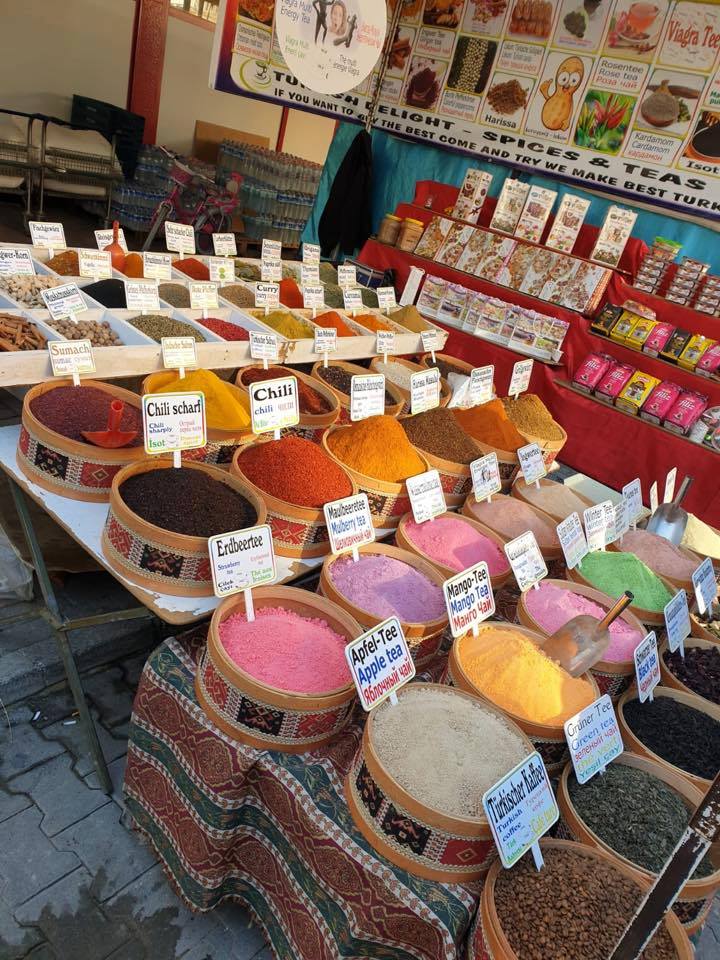
Workshops and lectures, also as quizzes, made the participant even more aware of the currently huge problem of plastic pollution and inspired the students to continue with the wave of positive changes in their local communities, as well as worldwide, by using the power of the Internet and social media.
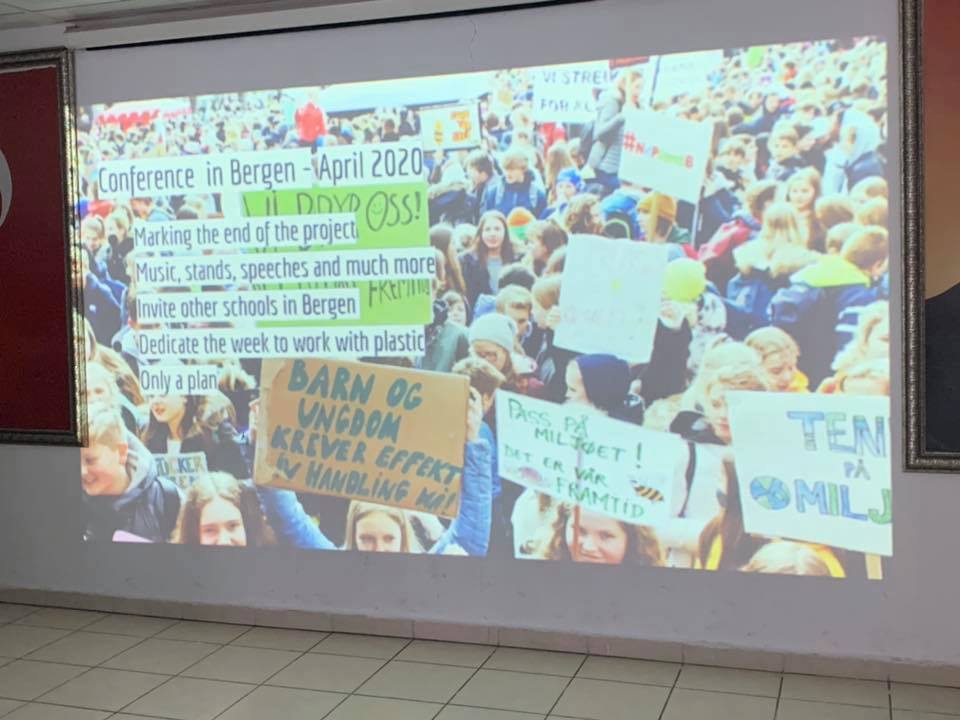
Also, there was time for visiting a mosque with four towers in Manavgat, exploring the ancient port city Side (2nd-century Antique Theater, Apollon Temple, museum) and a boat ride. In addition to the activities related to plastic pollution, the days were filled with culture and nature sightseeing which left no one indifferent.
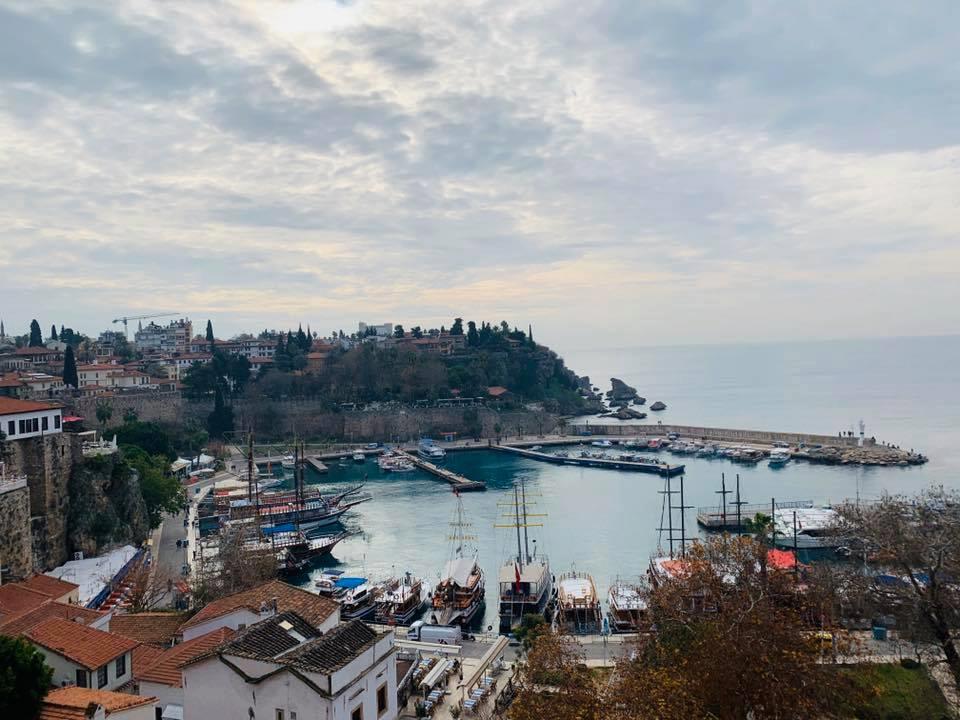
A day before going home, the delegation visited Antalya, which is often called one of the most beautiful cities on the Turkish riviera. The participants walked through the old city and enjoyed the streets full of restaurants, souvenir shops and small hotels, which are situated in the old houses previously used as residences. During the visit to Mevlevihane museum, the students learned that the origin of the spinning ritual (also called sema) is attributed to a widely revered holy man called Rumi, who preached inclusivity, tolerance, love and respect for all, regardless of their religion. The trip finished in a magical way, as the delegation saw the end of Düden Falls which drops off a rocky cliff directly into the Mediterranean Sea.
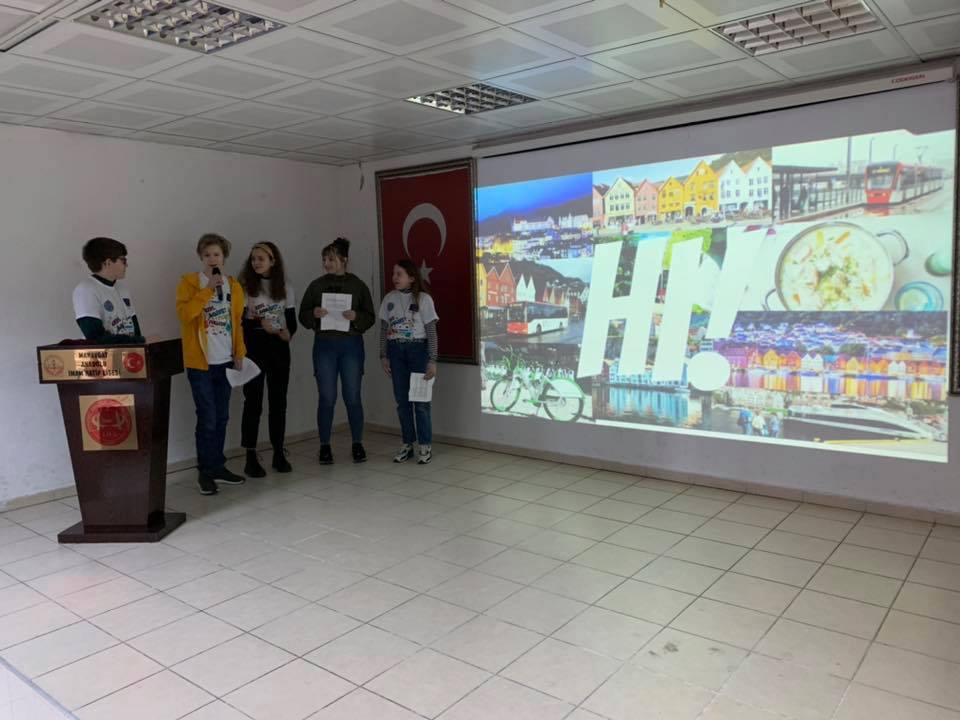
The students did not only get to experience their first flight by plane, but also got to live with Turkish host families. The students got to meet the Turkish way of life first hand, including their customs, but also felt their huge hospitality.
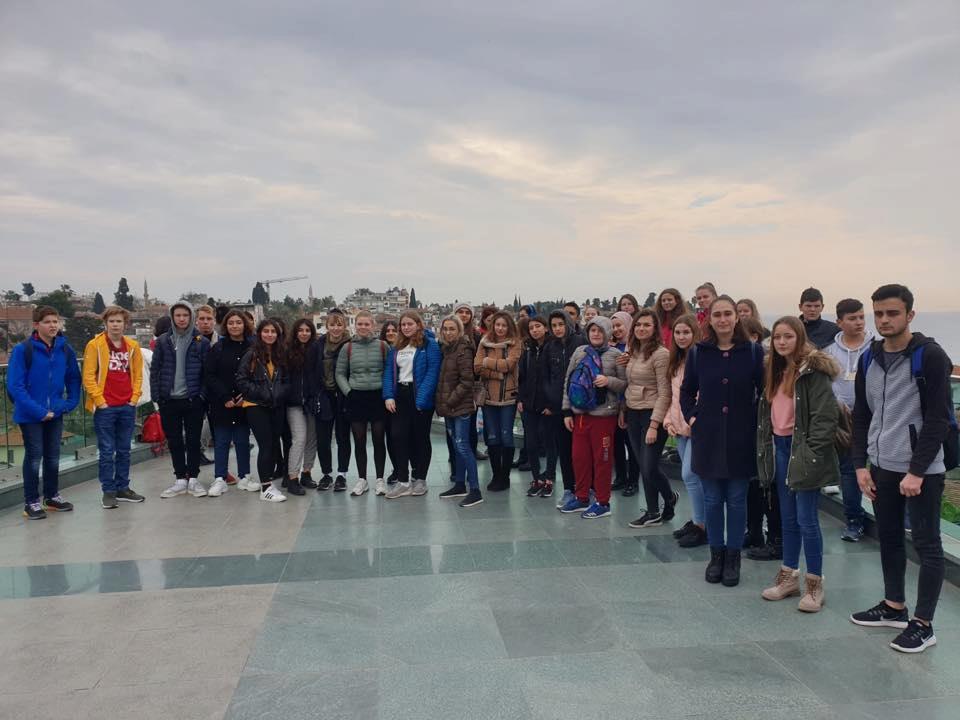
„Since I live in a Christian family, for the first time I saw how it is to live with Muslims and I had the chance to see their way of life. In the house of the boy Erdem I felt very comfortable, and his parents gave the Norweigan boy Vegard and me a warm place to stay,“ said fifth-grade Croatian student, Dorian. He added: „Also, I learned how many years are needed to degrade some plastic products and what each of us can do for a better world without plastic. By learning and having fun with new friends, also I managed to fall in love.“
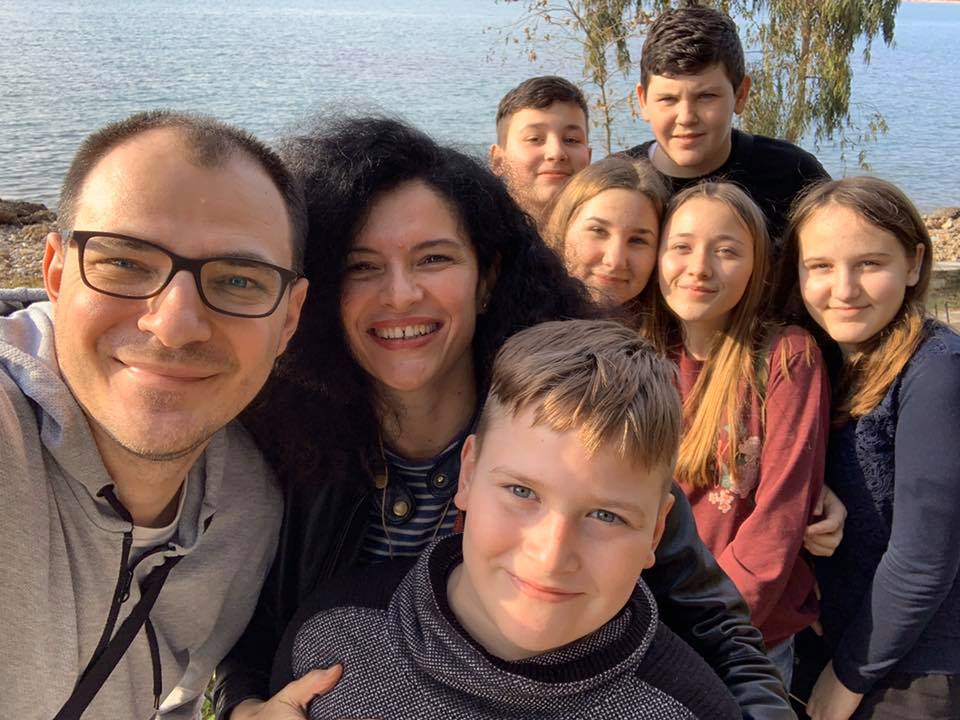
"Being in Turkey with this project was a wonderful experience. We were received with kindness and warmth by our host families, who showed us nothing but hospitality and love. It was a very eye-opening experience, since we visited a water plant where plastic is gathered so that it doesn't end up in the sea. And the figures were shocking: around 3 tonnes of plastic end up daily at the plant, only from the hotels' area. We also drew posters and cleaned up the beach in Manavgat, in order to get a little bit closer to our goal and be an example for the locals. But while dealing with plastic related issues, we also found time to have a great deal of fun. We visited ancient ruins, went on a boat trip, played games, learned traditional dances and let's not forget one of the most important parts: We loved Turkish food," said 16-year-old Romanian student Ana-Maria Avram.
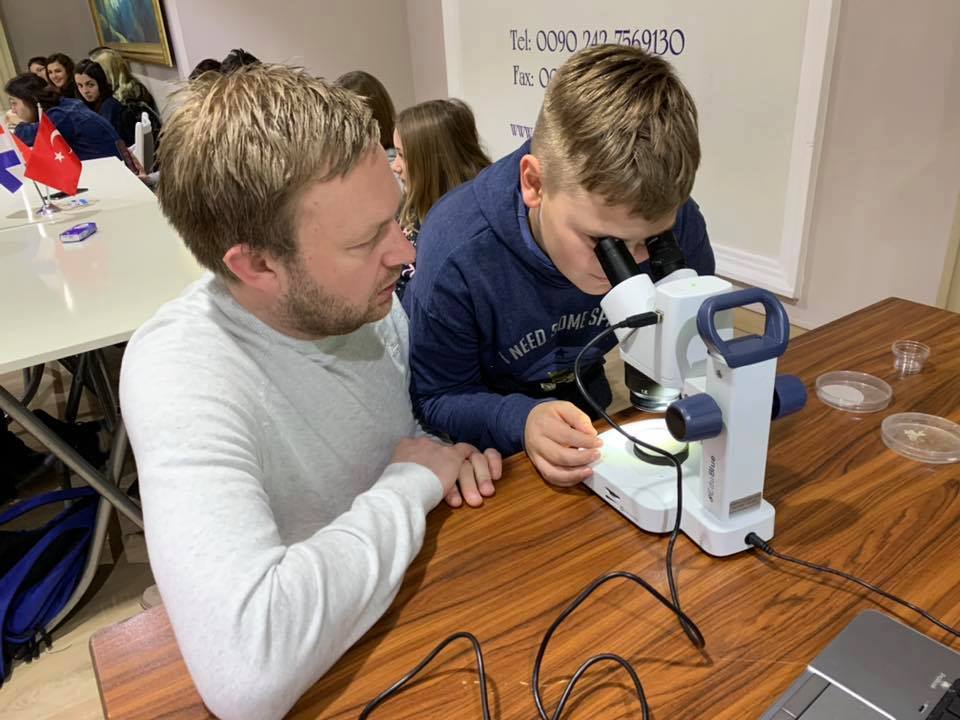
„I feel sorry for everyone not being here to experience what we have been through“, said the 15-year-old Norwegian student Anna Bakke. She could not stop talking about her fantastic host-family who took her with them to visit their whole family, showing her Turkish customs and giving her the experience of a lifetime. Throughout the week, she and the other students from Bergen, had through the different activities learned more in a week than most pupils do during a whole school year. About culture, plastic-pollution and how we can prevent it, in addition to getting new friends and learning something about themselves.

Since the way back home was long enough, there was plenty of time for making new plans for the upcoming mobility in Bergen and Odda, with the main accent on a very important conference where some of the results of the project will be presented.
The Croatian students came back to Baranja on the 18th of January 2020, and their satisfaction suggests that the program of this mobility was quite a success.
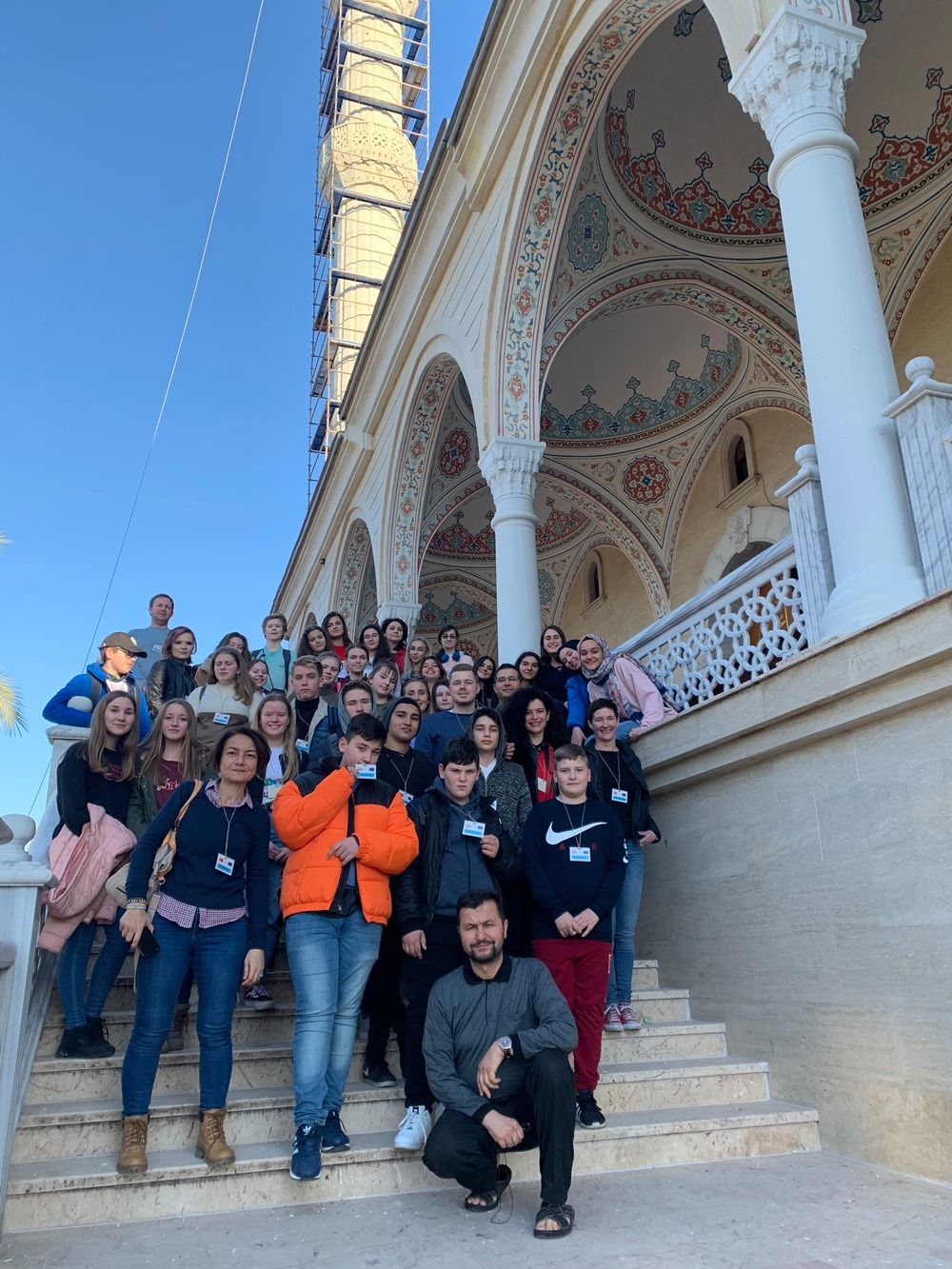
All the project activities, which are financially supported by the Agency for mobility and European union programme, can be followed on the official Facebook and Instagram page „Kids Against Plastic Pollution“.
You can follow the latest from Popovac school on Facebook.
Baranja Students Send Letter to President Grabar-Kitarovic: She Replies
October 18, 2019 - Croatian President Kolinda Grabar-Kitarović has replied to an Erasmus+ team of students from Primary school Popovac, encouraging them to continue their activities with their friends from Norway, Turkey and Romania against plastic pollution.
The students from Baranja wrote a letter in which they wanted to hear her thoughts about problems related to using too much plastic in our everyday lives and asked her to talk more in public speeches about that huge problem.
Also, they invited her to join them at the conference next April in the Norwegian city of Bergen, where they will meet with other students from European school to discuss plastic pollution.
In her reply, the President wrote that she is happy to know that each day more and more young people in Croatia are aware of the importance of taking care of the environment. She added that during her recent visit to New York, she spoke at the UN General Assembly about the topic of environmental pollution, especially of the sea in which people throw away a lot of different trash. To world leaders she mentioned the good example of the Croatian island Zlarin.
Their 300 local citizens made huge and very important changes in the fight against plastic pollution.
„I'm satisfied that our President is aware that plastic pollution in our rivers, seas and oceans is one of the biggest threats that humans are fighting against. I never thought that someone so important would reply to us students from such a small school,“ said eighth-grade student Lucija.
„It's a little bit sad that our President can't travel with us to Norway. It would be so cool to meet her. Her reply is another motivation for us to keep participating in all activities as part of this important project in which each of us with our hearts and way of thinking dedicates time to taking care of our environment,“ added sixth-grade student Ivano.
The President's letter made many students very happy. They gathered in the school's library where they read it a few times with disbelief. They decided to put this letter into a frame. Other students from Norway, Turkey and Romania are also eagerly awaiting the next mobility where students from Baranja will proudly show the letter and translate all the encouraging words from the Croatian president.
Popovac Primary School, a Creative Beacon of Hope in Baranja
October 9, 2019 - It is tucked away (very neatly) in an almost forgotten part of eastern Croatia, but Popovac Primary School in Baranja is a truly remarkable institution.
One of the things I love most about running Total Croatia News is the randomness of my inbox. Yes, there is lots of abuse from people who object to an article or two that I write (but I am learning to accept and appreciate the abuse as the years go by), but people from all walks of life and all over Croatia (and beyond) contact me for a number of Croatia-related reasons.
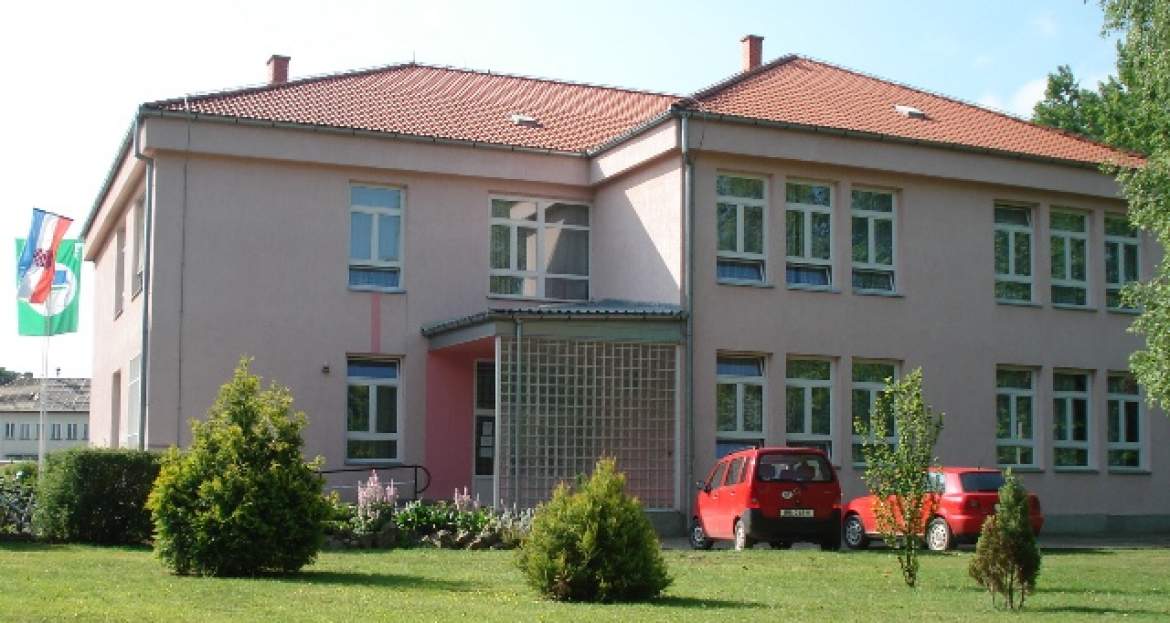
One of my favourite of such emails came from Goran in Baranja a couple of years ago. He wanted to volunteer his writing services so that he could present stories about the lovely region of Baranja, north of Osijek and on the border with Hungary. Goran explained that he was a teacher in primary schools, including Popovac, and it did not take long reading his email to understand how passionate he was about his job, or how much he wanted the best for his pupils:
The Internet connection was much slower in villages than in cities when I started work, but it didn't stop my students from winning an award for the best school website by CarNet (Croatian Academic and Research Network), nor did it stop them from participating in many projects that even brought them to the European parliament in 2009! We are a small school, but with all the activities and projects we have, we're the soul of our village. There aren't many activities out of school for kids and when you offer them something interesting to participate in, they are very motivated and always give their all.
A Baranja school in the European Parliament! And it was indeed true, as Glas Slavonije reported in 2009 (there is a translation below - thanks Lauren).
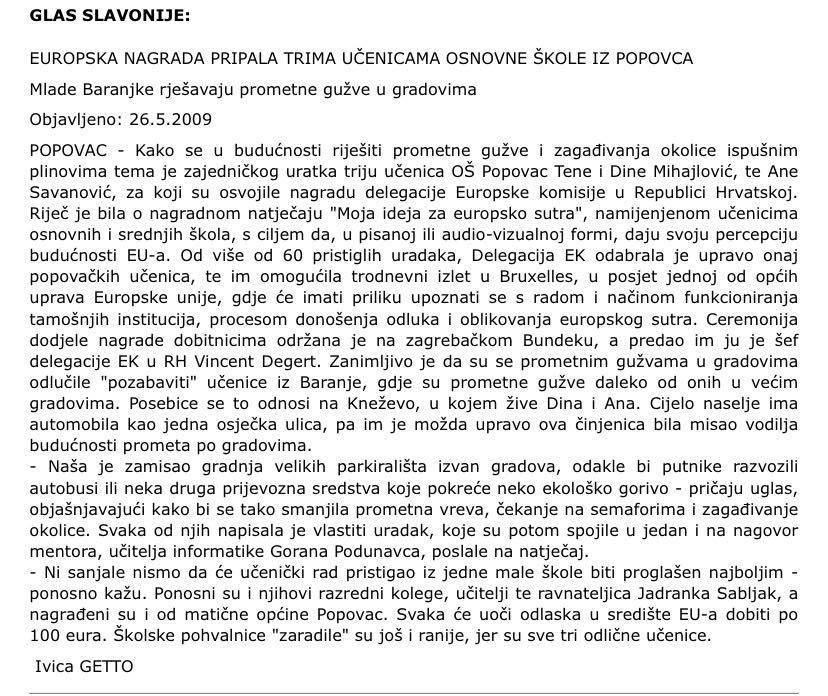
Popovac - How to deal with traffic jams and pollution in the future is the topic of a joint discussion between the three students of OS Popovac, Dina Mihajlovic and Ana Savanovic, for which they won an award from the EC Delegation in the Republic of Croatia. Popovac - How to deal with traffic jams and pollution in the future is the topic of a joint discussion between the three students of OS Popovac, Dina Mihajlovic and Ana Savanovic, for which they won an award from the EC Delegation in the Republic of Croatia.
This was the "My Idea for a European Tomorrow" prize competition, aimed at primary and secondary school students, with the aim of giving their perception of the future of the EU in written or audio-visual form. Out of more than 60 entries, the EC Delegation selected the idea of the Popovac students and awarded them with a three-day trip to Brussels to visit one of the general institutions there, involved in the decision-making process and shaping the European tomorrow.
The award ceremony was held at Zagreb's Bundek and the award was handed to them by the Head of the EC Delegation to the Republic of Croatia, Vincent Degert. It is interesting that when looking at traffic jams in cities, they have decided to seek an ''address'' from students from Baranja, where the traffic jams are far from those in larger cities.
This is especially true of Knezevo, where Dina and Ana live. The whole place has as many cars as one street in Osijek has, so perhaps that fact was the thought process guiding the future of traffic in cities project.
''Our idea is to build large out-of-town parking lots, from which buses or other vehicles powered by environmentally friendly fuel can transport people'' - they state, explaining how this would reduce traffic noise, waiting at traffic lights and pollution in the surrounding area. Each of them wrote their own piece of work, which they then combined into one and at the encouragment of their mentor, computer science teacher Goran Podunavac, they sent it to the competition.
I never dreamed that students' work from a small school would be proclaimed the best - they say proudly. Their classmates, teachers and headmaster Jadranka Sabljak are also proud, and have been honoured by their home municipality of Popovac.
They will receive 100 euros each before leaving for the centre of the EU. These school honours have been "earned" even earlier, as all three are excellent students.
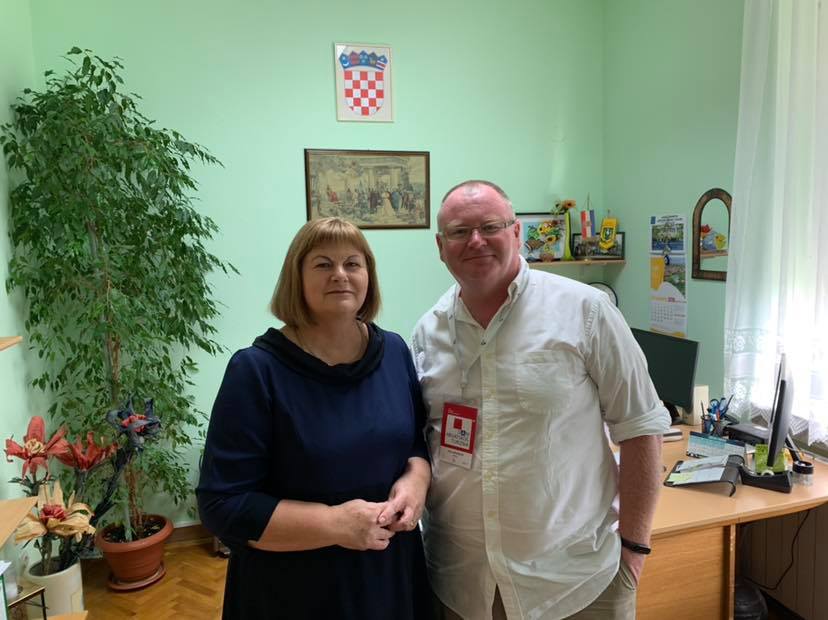
Goran started writing a few stories for us, and when he told me that Popovac Primary School also had a project for young web journalists, I suggested that some might like to write something for TCN, which they did, including one memorable account of what it is like to be the only pupil in the class. You can see the articles from Goran and the kids here. Popovac had also won the title one year of best school website in Croatia and it has been an eco school since 2002. I knew I had to visit.
An opportunity arose last week when I headed east for Days of Croatian Tourism in Slavonia, and Goran kindly arranged a tour of the school and Popovac, including a meeting with headmistress, Jadranka Sabljak. It was great to catch up with Jadranka and hear her vision - she has been at the school for no less than 35 years. Now that would be a great interview.
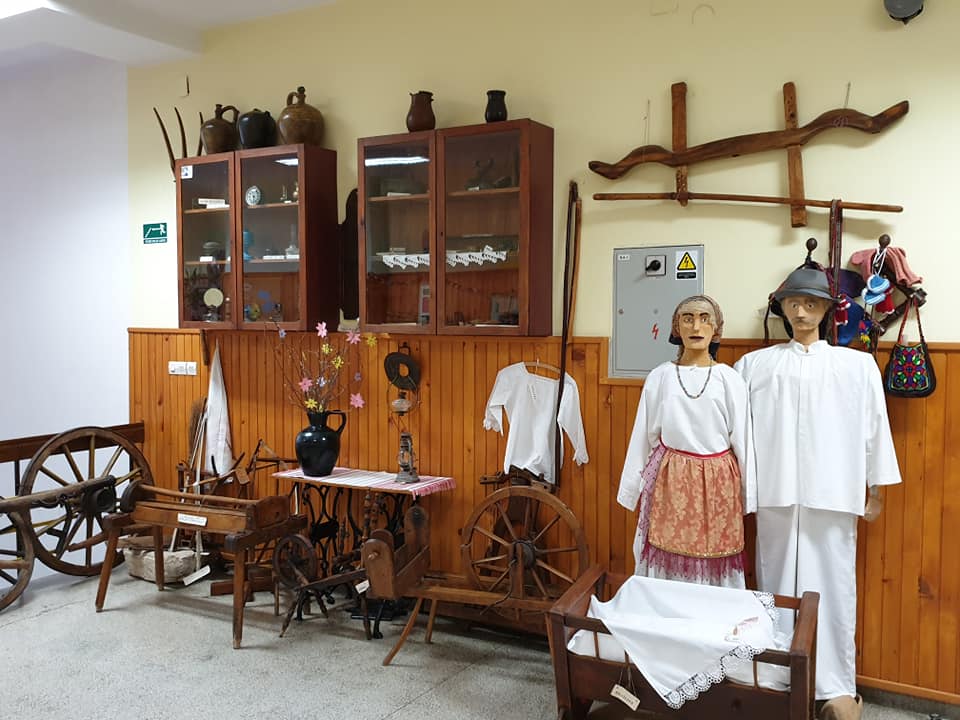
Popovac might be as far from the centre of Croatia as it is possible to be, but rarely have I seen such a lively, loved and creative public institution, whose staff clearly care deeply both about the school and the welfare of its pupils. And its traditions and heritage.
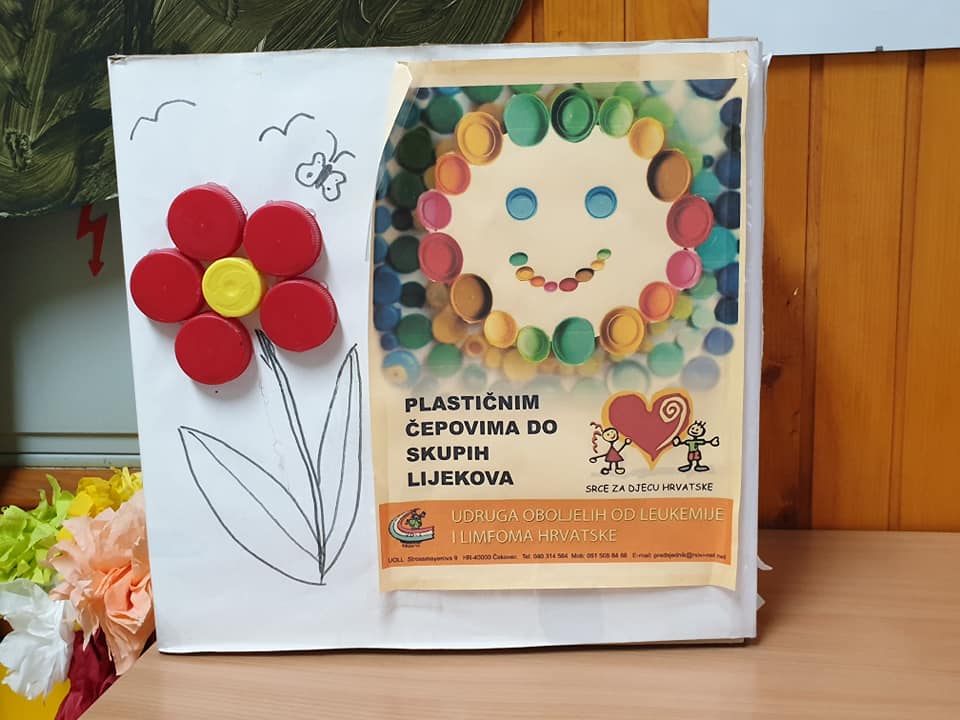
And you don't get to be an eco school for 17 years without the messages of recycling and the environment at every corner - creatively done of course.
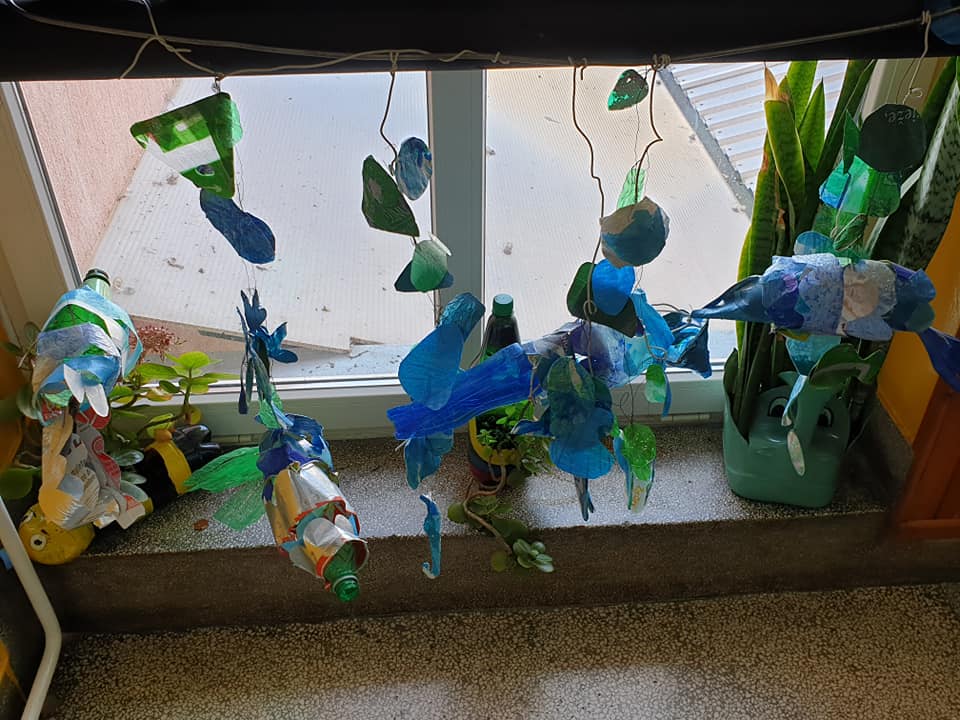
Everywhere... This was one highly creative school.
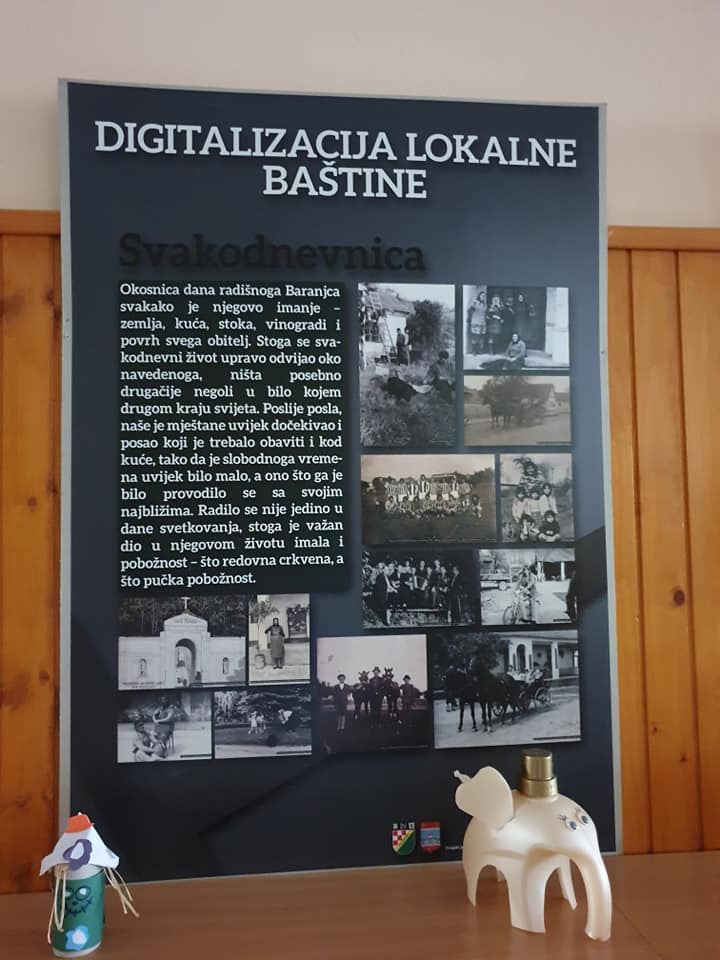
And one very much embracing the future and technology, despite being in such a perceived remote backwater. In some ways Baranja is actually quite accessible. As I noted in my 10 Things I Learned at Days of Croatian Tourism in Slavonia, Baranja is actually the closest point in Croatia to the most important international airport hub in the region - Budapest.
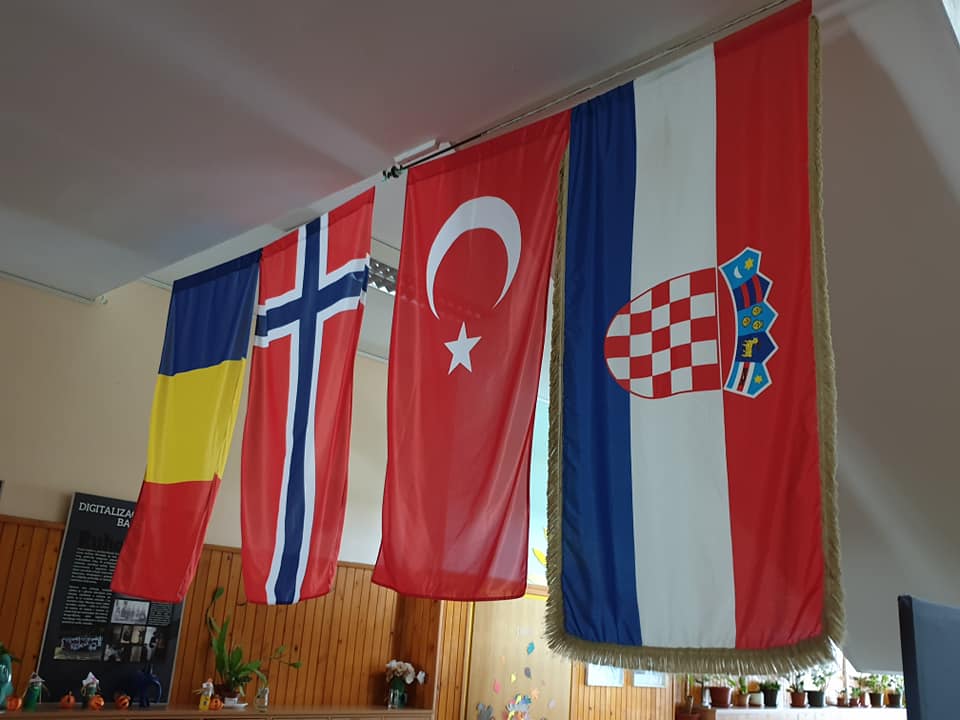
I was surprised to see the flags of Norway, Turkey and Romania hanging alongside the Croatian flag in the main school corridor, but I should not have been, for as Goran wrote for TCN, Popovac is very actively engaged in an Erasmus programme with schools from those countries in a project against plastic pollution. You can read Goran's account here.
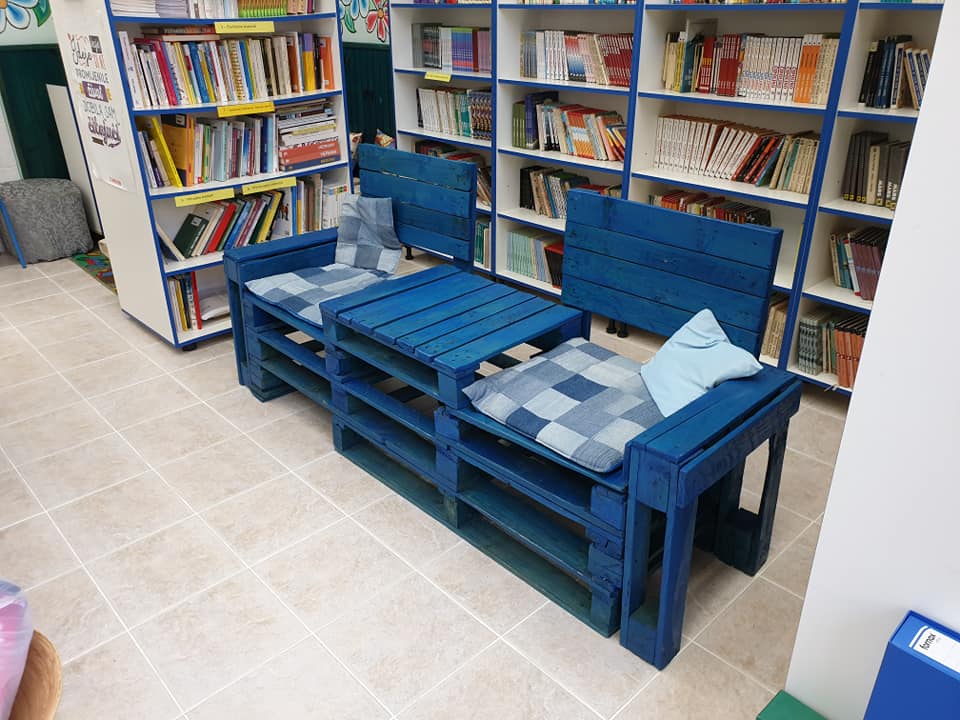
And just as you encountered the Popovac eco credentials, so too the creative side of life. With dedicated teachers like this, school must really be a joyful experience for these Popovac youngsters. The cushions on the chairs are made from old jeans of the kids.
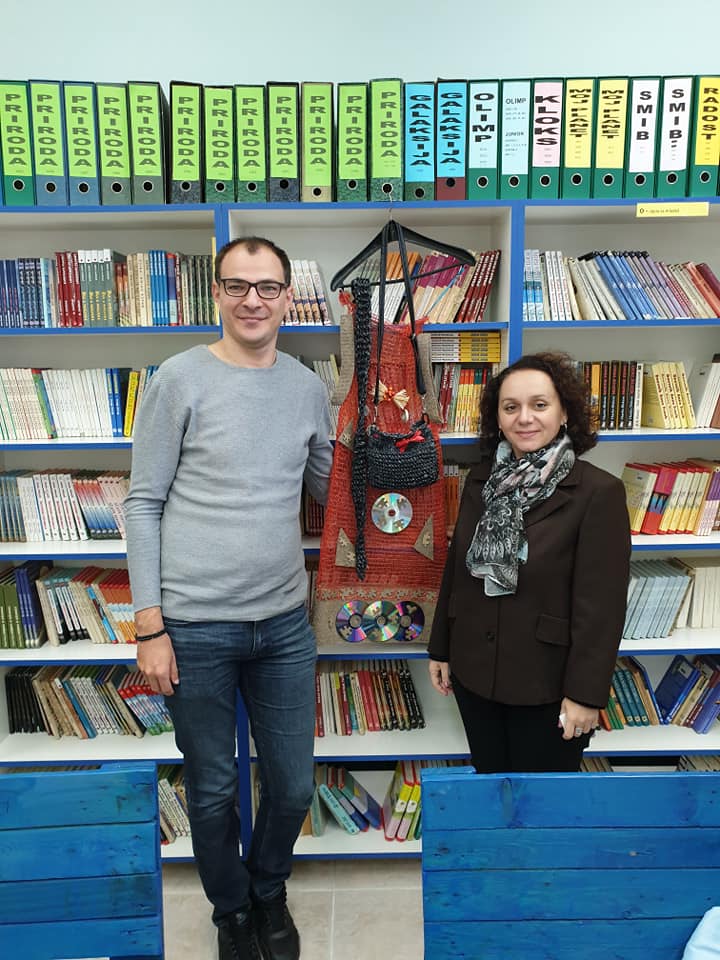
Two of the creative geniuses inspiring young Baranjan minds, in between a party frock made from recycled materials - Goran and creative and bubbly librarian, Marijana Kuna.
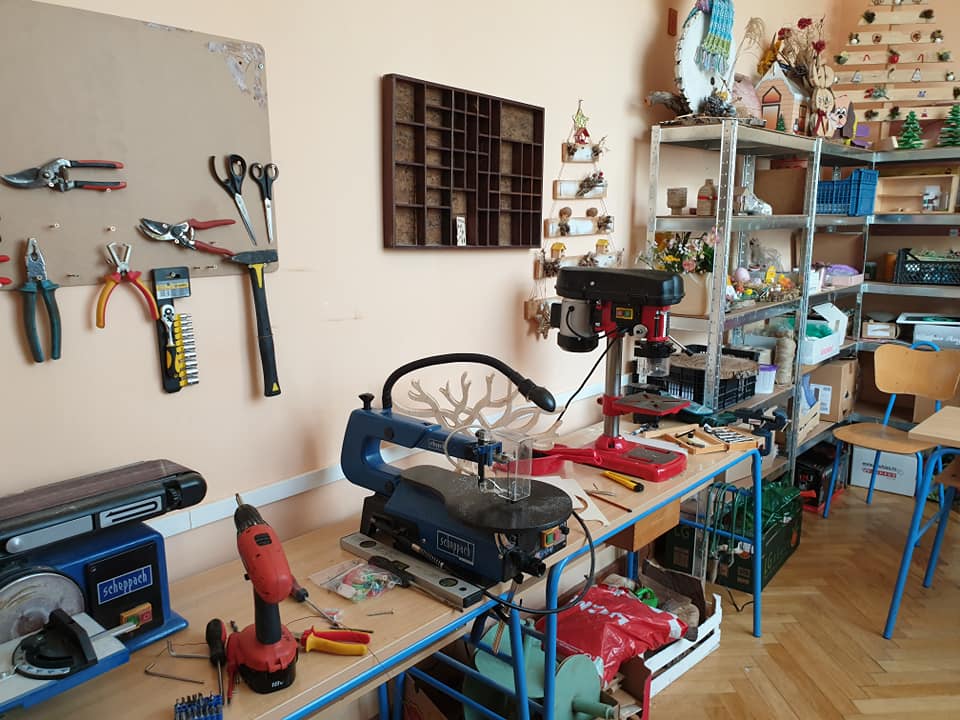
The workshop.
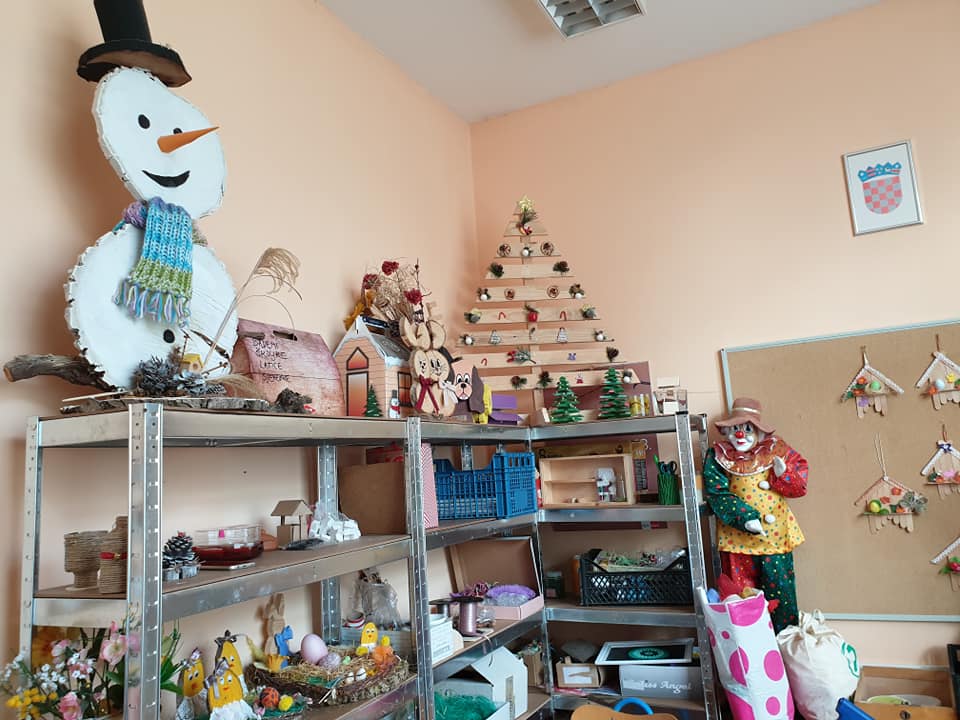
Christmas is coming. Time to turn recycled materials into decorations.
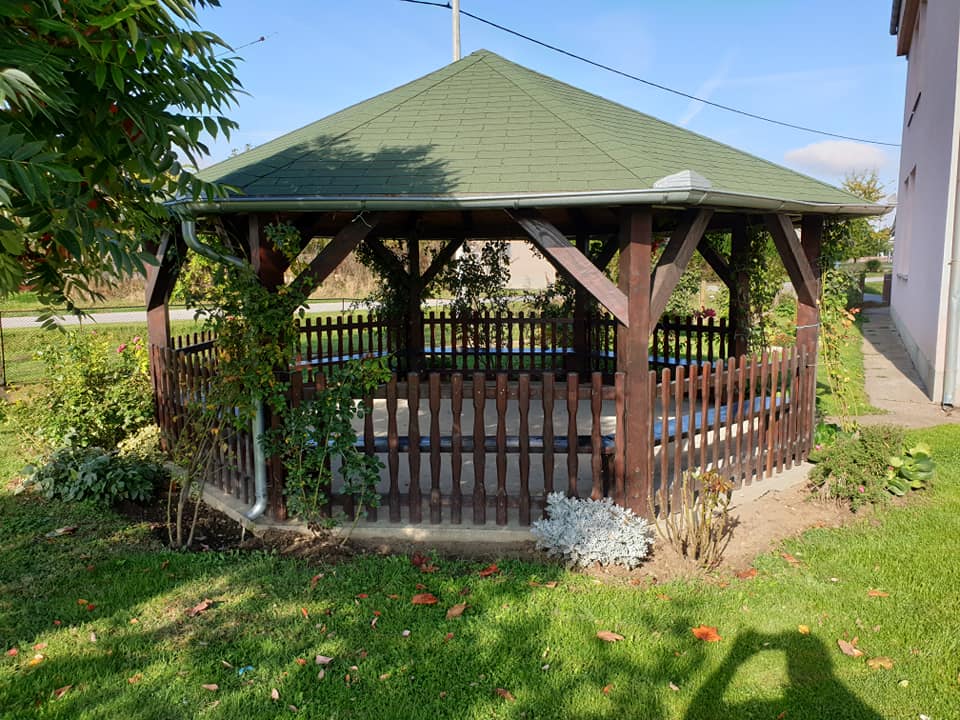
And when the sun shines brightly, as it did on my visit, take a break from the routine of the classroom and take the education to an outdoor classroom in nature.
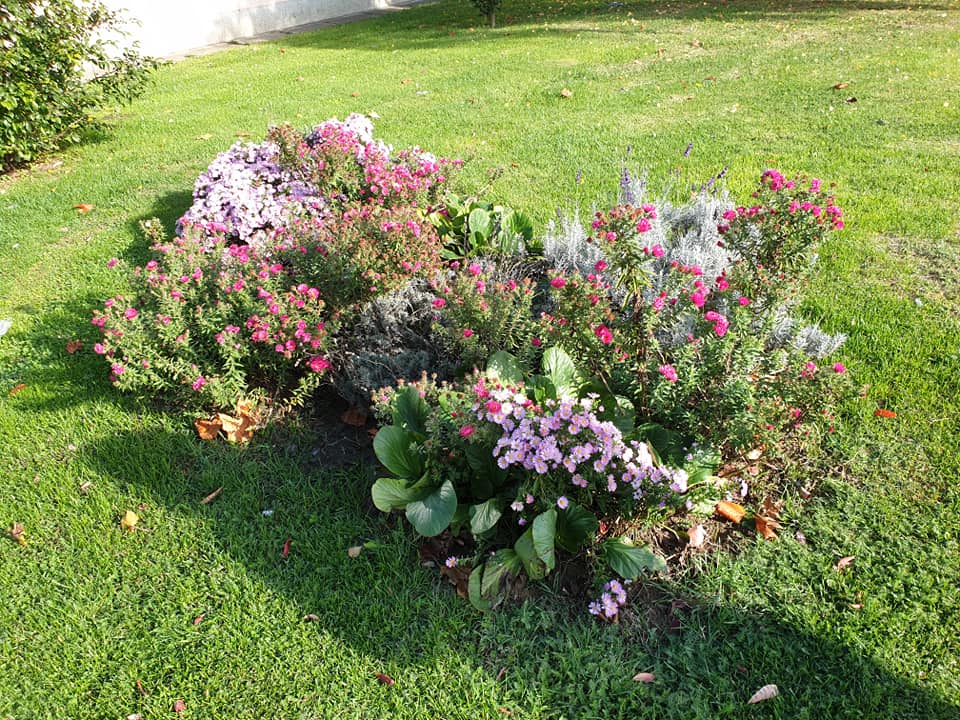
Surrounded by beautifully keep gardens.
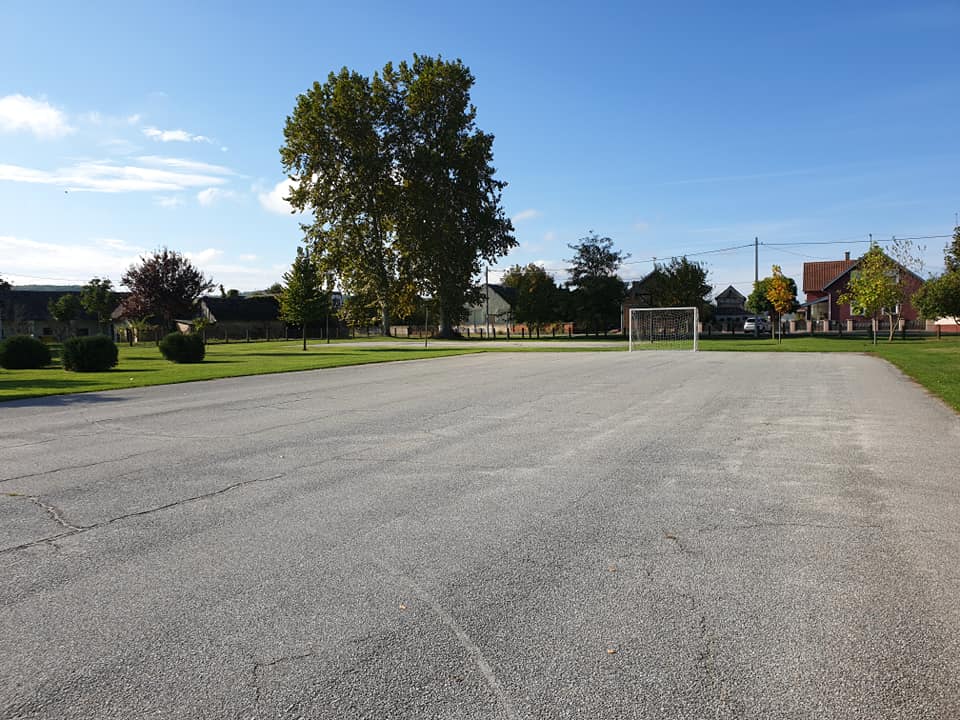
Ample space for physical exercise.
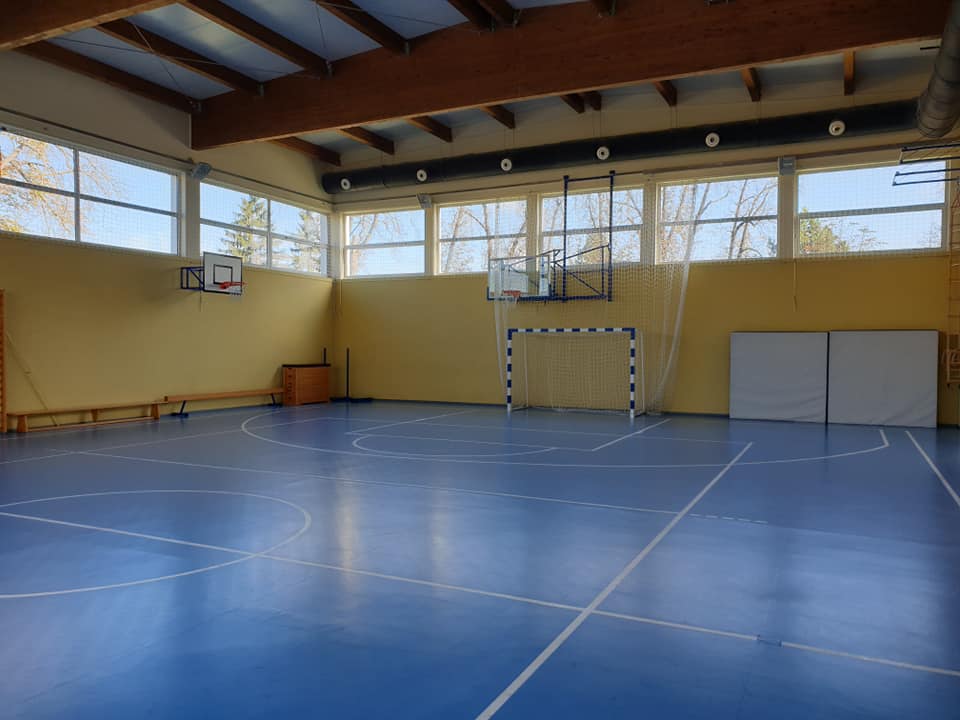
Both inside and out.
"You seem to have everything," I commented, really rather impressed and very much enjoying my visit despite the 05:45 start to the day so that I could fit Popovac into my busy schedule for the day. "Is there anything you are missing?"
"Just one thing. Kids."
The emigration from the east. The simple numbers tell it all. The 2011 census recorded a population of 2,500 people for Popovac and surrounding area. Unofficial estimates from officials put today's figure at about 1,100 just 8 years later.
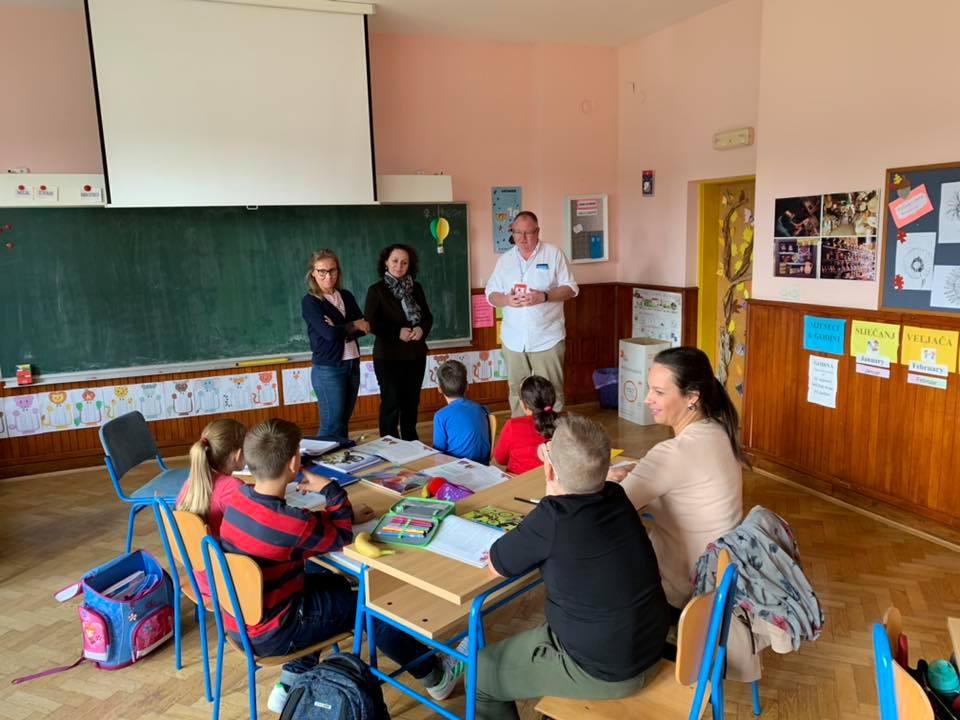
And while I am sure that the lack of employment and opportunities are worries for the parents, the kids are having an idyllic start to life, and there are clearly enjoying the creative environment of their special school. And they were very patient and welcoming when a fat Brit interrupted their classes last week.
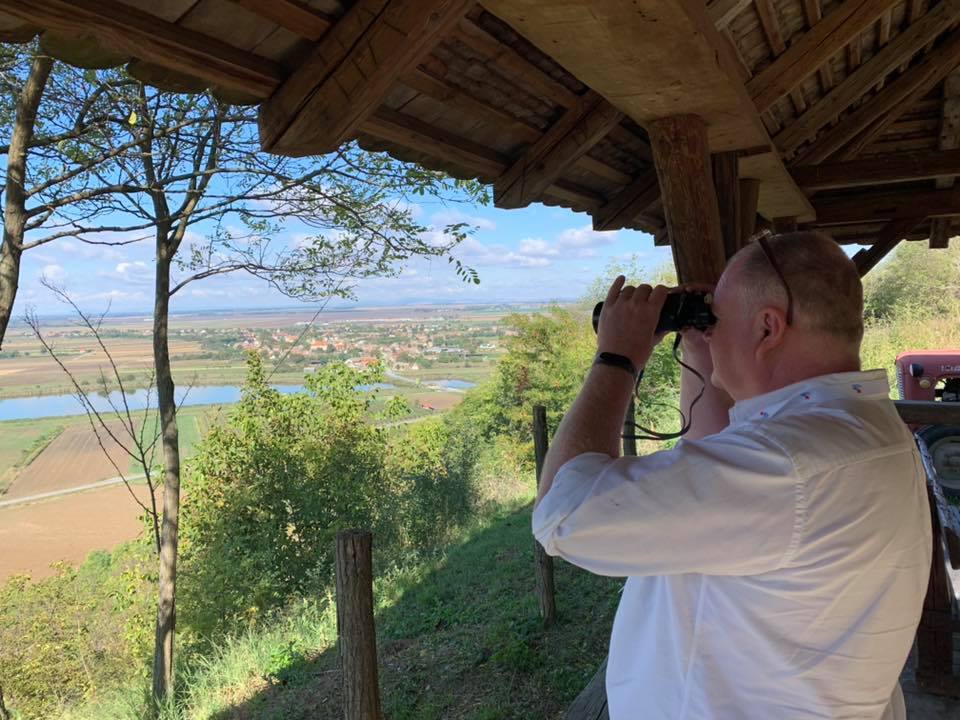
I had come to the east of Croatia knowing I would meet great people (it is impossible not to in Slavonia), but I thought I would come across a lot more despair. Quite the opposite was true. People here have got such a great attitude to life, the nature truly is unspoiled, and there is a great sense of community and a very safe environment.
As I took a tour of the area with Goran, Marijana and the deputy mayor to the highest point of Baranja (not that high!), I looked back over the flatlands of Baranja and Hungary beyond, and I wondered. Emptying today, but for how long?
As they said in the school, the only thing missing in this paradise is jobs which has led to people leaving. In many other aspects, it is a gorgeous place to live, especially for those looking to escape the rat race in exchange for a more natural way of life.
The digital revolution is coming, and it will come to Baranja as well in time. With one estimate of one billion people working remotely by 2035, I for one would not be surprised if a little creative thinking and investment might reverse the emigration and attract people to come and work remotely and raise their kids in this lovely, natural part fo the planet.
During my meeting with headmistress Jadranka, we talked about a couple of projects of collaboration between TCN and Popovac, of which more next year, but I was struck by her initial response to my enquiry.
"We sadly do not have money for projects, but lots of desire, goodwill and our time. We are open to all suggestions."
Perhaps you have a suggestion to establish ties with Popovac. You can follow the latest from Popovac School on Facebook.
To learn more about the magic of eastern Croatia, here are 25 things to know.
Municipality in Slavonia Co-Finances Purchasing of Homes
As Novac writes on the 27th of September, 2019, in order to attract new residents, as well as attempt to retain current residents, the municipality of Popovac in Slavonia decided to make it easier for interested families to buy a property. Namely, the municipality provided six of them with houses whose prices average at around 100,000 kuna with a subsidy of 125,000 kuna.
The aforementioned municipality in Slavonia will participate in the payment of a quarter of each house, and the new owners will be able to invest the mentioned amount.
''For example, to buy furniture, household appliances or use it for something else,'' explained Zoran Kontak, the mayor of the Popovac Municipality.
He emphasised how pleased he is with young families, couples and those who are about to have a family. A budget of 200,000 kuna was secured in this year's budget, and he announced that he would continue with the program next year, according to a report from Glas Slavonije.
''This is just one of the measures aimed at preventing the departure of younger people, especially those who are considering whether it is wiser to buy or build a house in the Popovac Municipality,'' Kontak added.
In addition to this incentive, he explained that he is also allocating 5,000 kuna for each newborn baby from the municipal budget. In addition, the municipality readily assists in the procurement of school textbooks, provides transportation for high school students, co-finances their placements, and even awards scholarships.
Otherwise, an estimated 500 people have left the Popovac municipality in recent years, which is commonplace throughout Slavonia as a whole as the demographic crisis continues to not only bite but spread across the country, affecting areas which previously saw very little movement in comparison to the Eastern Croatian region of Slavonia.
Make sure to follow our dedicated lifestyle page for much more.


